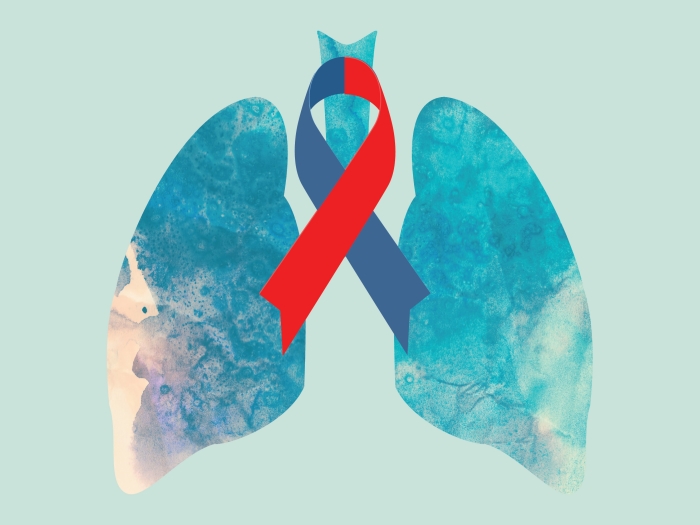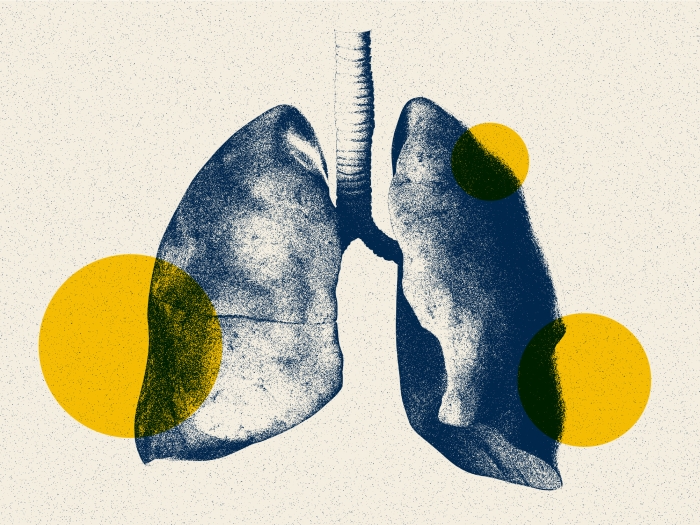After being diagnosed with chronic lung disease, a patient works hard to follow a treatment plan — and to embrace his faith and family.
1:00 PM
Author |

When Ken Grice came down with a severe case of pneumonia in June 2015, he thought he would feel better in a few months.
He didn't.
MORE FROM MICHIGAN: Sign up for our weekly newsletter
"After being hospitalized for three-plus days, I was happy to leave, and when I got home I was expecting to get back to my previous state of health," the 74-year-old says. "But for the next six months, I continued to not feel well and knew I should pursue looking into it."
After physical testing and a high-resolution chest CT scan in January 2016, Grice received a diagnosis of idiopathic pulmonary fibrosis.
Pulmonary fibrosis occurs when the tissue deep within the lungs becomes thick and scarred over time, leaving the lungs unable to properly transfer oxygen into the person's bloodstream. Symptoms include cough, shortness of breath and fatigue.
As in Grice's case, the condition can be idiopathic, meaning doctors can't find a cause for the disease within the body.
The illness was familiar: "My sister had passed away from idiopathic pulmonary fibrosis," Grice says, "and while there might be a linkage there, the cause for me having it, too, is still unknown."
Grice was happy that his physicians did not need to do a biopsy, and that his insurance company didn't require one for continued care.
But the diagnosis was especially hard because Grice wasn't just worrying about himself.
"I was, and still am, the principal caregiver for my wife of 54 years," says Grice, a resident of Belleville, Michigan. "She's been my girlfriend since the seventh grade and is a precious lady."
Grice wanted to continue to care for his spouse, so he began researching how best to manage his condition.
A strong care team
Grice met with his new care team, led by Beth Belloli, M.D., assistant professor of pulmonary medicine at Michigan Medicine. The fit was good from the start.
"I felt comfortable with Dr. Belloli, and she seemed to feel comfortable with treating me," Grice says. "She also works at the Ann Arbor VA, which gave us more common ground because I am retired from working for 40 years in the military."
SEE ALSO: Hospital Harmonica Group Helps Lung Condition Patients Thrive
Grice says that his first appointment with Belloli was the start of a new journey for him.
"My daughter and son came with me to the first appointment; I would tell other patients that it is great to have an advocate with you at your appointments," he says. "Dr. Belloli started the discussion about how it was concluded I have IPF, and I asked several questions about what that means."
Grice learned the condition could be terminal, which came as a shock to his family members.
The patient, however, remained composed.
"For me, with 40 years of military training, you don't get shaken by much," Grice says. "I said, 'Well, tell me more.' We talked about the facts and where we could go forward."
Belloli suggested a treatment approach that combined medicine, therapy and information-gathering.
"Mr. Grice has been a very active participant in his treatment plan since the day I met him," Belloli says. "With idiopathic pulmonary fibrosis, each patient's disease course is unique. There is still a lot we don't know and need to learn about the condition."
One way to continue learning about the condition: clinical trials.
"Mr. Grice has also enrolled in a clinical trial to further our knowledge about the therapeutic options for patients with pulmonary fibrosis," Belloli says. "At the University of Michigan, one of our main goals is to investigate new treatment options that can help patients with pulmonary fibrosis."
After Belloli suggested pulmonary rehabilitation at Michigan Medicine, Grice agreed "without a second breath." Pulmonary rehabilitation consists of specialized exercises and education that help patients with their breathing and builds strength and endurance.
"I started by going three days a week, and the physical therapists do an excellent job addressing everything that needs to be maintained based on the individual and the state they are in and what needs to be improved," Grice says. "After a year and a half, my condition remained stable and my lung capacity went from 85 to 87 percent— which, for this condition, felt great."
Grice contracted a bad cold this year that lowered his lung capacity, the amount of air the lungs can hold, but he has been working hard to bounce back. Continuing pulmonary physical therapy, he says, has improved his outlook on life.
With idiopathic pulmonary fibrosis, each patient's disease course is unique. There is still a lot we don't know and need to learn about the condition.Beth Belloli, M.D.
Making each day count
Grice adds that one of the highlights of his care at Michigan Medicine has been the pulmonary fibrosis support group that meets the first Tuesday of every month.
"Lori Flint is the nurse that organizes it, and she invites a different person of importance on our issues to speak," Grice says. "The information we glean from each other is encouraging and points us towards new directions. I'm thankful for it and make it a high priority to attend."
One recent group discussion topic: the importance of maintaining quality of life.
"You know, what makes us excited to wake up for the day," Grice says. "For me, it's taking care of my bride and doing service projects in our community. Part of my enjoyment is having a nice glass of wine with dinner every night."
Grice isn't going to the store to pick out a bottle — he bottles his own.
"I realized the ones I really like, I can't really afford on a regular basis," he says. "I figured out I can bottle wine and get the same quality for far reduced costs. And the process of making my own wine and bottling it is fun and a form of exercise. It gets me out of the house and raises my spirits, literally and figuratively!"
Moving forward
A medical situation in his family prompted Grice's son to ask his father to participate in blood tests so their doctor could analyze the family's genetics.
SEE ALSO: 5 Strategies to Help Caregivers Practice Self-Care
Ken Grice notes that he has used this information and his family physician, as well as continued discussions with Belloli, to continue managing his condition.
"I'm taking their advice, analyzing it and studying what I can on the condition from medical websites and the Pulmonary Fibrosis Foundation website," Grice says. "I'm finding reinforcing positive signals that I'm on a good path for maintenance."
Grice says his faith is allowing him to make this experience into a positive, rather than a negative.
"I have a strong faith, and I believe that what ultimately will happen to me is out of my control as long as I do the things in my control," Grice says. "I have a regimented background of training and decision-making, which helps me approach everything logically, and I have a very supportive, loving family and friends."
Grice continues to be an active participant in his health care. He remains the primary caregiver for his wife and works with a Christian youth program, Young Life, in his community.
"I'm enjoying each day for what it has to offer with my children and nine grandchildren," he says.
The U-M Division of Pulmonary and Critical Care Medicine is a Pulmonary Fibrosis Foundation Care Center Network Site. For more information and to learn more about the PFF Patient Registry, please visit the foundation's website.

Explore a variety of health care news & stories by visiting the Health Lab home page for more articles.

Department of Communication at Michigan Medicine
Want top health & research news weekly? Sign up for Health Lab’s newsletters today!





